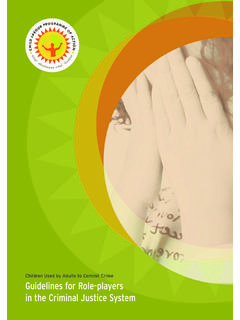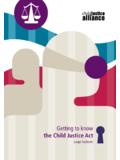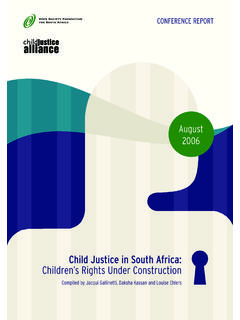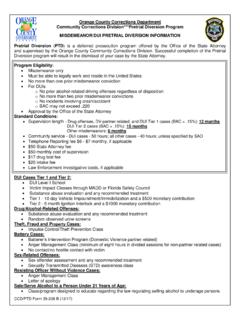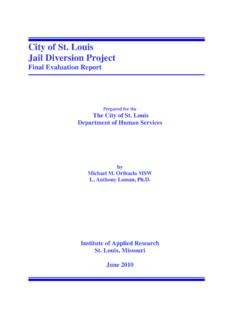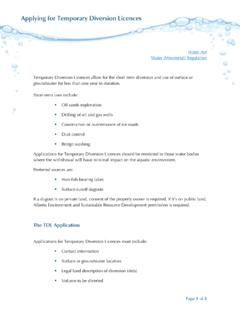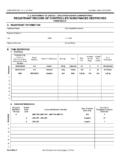Transcription of Policy Framework for the Accreditation of Diversion ...
1 Final DraftPolicy Framework for the Accreditation of Diversion services in south africa CONTENTS PART ONE CHAPTER 1 CONTEXTUALIZATION OF Diversion IN south CHAPTER 2 SITUATIONAL CHAPTER 3 Policy & LEGISLATIVE CHAPTER 4 OBJECTIVES 0F THE PURPOSE OF CHAPTER 5 SCOPE OF THE Policy & PRINCIPLES 27 Transparency and Appropriateness and Evidence Holistic and integrated Investment in human capital and Quality Balanced and Restorative Victim Family and community Centred Graduated Sanctions (Continuum of Care and Development)..30 Democracy and Protection of Accreditation Framework Final Draft 2 Inclusiveness and procedural Facilitation of Quality and Consistency within CHAPTER 6 ELIGIBILITY CHAPTER 7 INSTITUTIONAL PART TWO CHAPTER 1 Accreditation PART THREE CHAPTER 1 QUALITY ASSURANCE CHAPTER 2 COMPLAINTS MECHANISM CHAPTER 3 MONITORING & CHAPTER 4.
2 82-92 Accreditation Framework Final Draft 3 DEFINITIONS The following terms are used in this Policy document: Accreditation is a formal, external monitoring process whereby the DSD Accreditation unit set performance standards for service quality, measure the merit of an organization in relation to these standards, and keep the organization accountable to the public. The process is based on self-assessment and review, as teams of peers and/or professional surveyors assess the quality of an organization s service delivery and provide assistance aimed at improvement. Accreditation signifies formal recognition by the DSD s Accreditation unit, through a quality assurance procedure, that an organization and Diversion programme meets professional and minimum standards criteria laid down for the type of programme.
3 Accredited organization/programme means an organization or programme that meets the requirements for Accreditation (compliance with standards) established by the department and set out in the department s Policy on Accreditation . Service user/client is used in two ways. It can refer to: a child at risk or in conflict with the law that is referred to an intervention or programme for the purpose of Diversion out of the criminal justice system; family member(s) of a child at risk or in conflict with the law that is referred to an intervention or programme for the purpose of Diversion out of the criminal justice system. Service provider is an external organization or individual who provide the Department of Social Development with specialized services that have been funded or purchased including but not restricted to social services ( Diversion , child cares) or consultation services Service refers to an operational unit of a service provider, (that which service providers provide a Diversion programme).
4 Policy Framework is a description of an interlinked and interdependent set of statements established as a Policy guide to action to support the achievement of the goal of a high quality of services . Accreditation Framework Final Draft 4 Quality Assurance is a system of planned and systematic activities that is undertaken in order to guarantee that the quality of Diversion programmes and services provided by organizations and the DSD meets predetermined standards. Continuous Improvement is a continuous process that identifies problems, examines solutions to those problems, and regularly monitors the solutions implemented for improvement.
5 It thus supports ongoing learning, development and improvement. In the context of Diversion services (or any other service focusing on behavior change and individual psychosocial development) a key strategy in any quality improvement process is a focus on outcomes and the effectiveness of service delivery in response to the behavioral change/ personal development goals of individuals. Registration means the least restrictive form of professional credentialing whereby a regulatory body maintains a list of people or organizations who have informed the body that they perform professional services for the public in a particular field. With regards to this Policy registration of an organization refers to registration in terms of the Non Profit Organizations Act (1997) and registration of an individual refers to registration in terms of the Social services Professions Act Child in Conflict with the Law refers to anyone under 18 who comes into contact with the judicial system, as a result of being suspected or accused of committing an offencei.
6 ACRONYMS CEO - Chief Executive Officer DG - Director General DDG - Deputy Director General DSD - Department of Social Development DQA - Developmental Quality Assurance PFMA - Public Finance Management Act NPO - Non Profit Organisation MTEF - Medium Term Expenditure Framework SETA - Sector Education and training Authority ODP - Organisational Developmental Plan Accreditation Framework Final Draft 5 PART ONE CHAPTER 1 1. INTRODUCTION Since the new south African democratic government (1994) called on all sectors of society to revisit policies and approaches in demonstrating commitment to transformation and change, Diversion services to children in conflict with the law continued to be provided the absence of a regulating Framework (Wood, 2003:1).
7 From 1996 onwards, a substantial growth in the number of children referred to Diversion resulted in various organizations and individuals becoming involved in the provision of Diversion services . At this point concerns related to the quality and impact of Diversion services were raised as the existing perception was that children were getting away with crime. To this effect (lack of legislation, growing demand and quality concerns), minimum standards for Diversion were developed. Although the primary purpose of the minimum standards was to protect the rights of children referred into these services , the minimum standards were also providing a Framework against which quality of services could be evaluated, promoting good practice and acceptable rigour in the design, delivery and monitoring of interventions.
8 With the promulgation of the long awaited Child Justice Act (75 of 2008), south africa , will on the 1st of April 2010, enter a new era in the regulation of Diversion service providers and programmes. The Act introduces the requirement that a child may only be referred to a service provider or programme that is accredited in terms of the Act. Service providers include government, non-governmental and educational bodies. It is envisaged that Accreditation would ensure that service providers meet minimum standards, and facilitate meaningful outcomes in Diversion programmes. In addition to Accreditation of Diversion programmes being a requirement of the Act, the Act also provides for quality assurance, and the monitoring and evaluation of programmes and service providers.
9 In this regard, the Act, particularly Section 56 (2)a, places the responsibility of developing such system on the Cabinet member for Social Development. Consequently, the Department of Social Development (DSD) was tasked with the development of a national Policy Framework and system for Accreditation of Diversion service providers and Accreditation Framework Final Draft 6 programmes in south africa . As such, this Policy and Accreditation system Framework has then been developed to provide strategic as well as practical guidelines and processes for the Accreditation of Diversion service providers and programmes delivered by these service providers.
10 The development of guidelines and processes took into account mandates and legislation relevant to the social development and child justice contexts. As this Policy is complementary to all other policies of the Department, that deals with the provision of social services in general, it aims, on a strategic level, to facilitate the achievement of priorities of the department. The Policy allows the DSD to through Accreditation , prioritise and support the implementation of quality services and effective and impactful programmes to children at risk and in conflict with the law. Accreditation thus provides the DSD with a quality assurance mechanism, enabling monitoring and evaluation of the impact of Diversion services and programmes in south africa .


